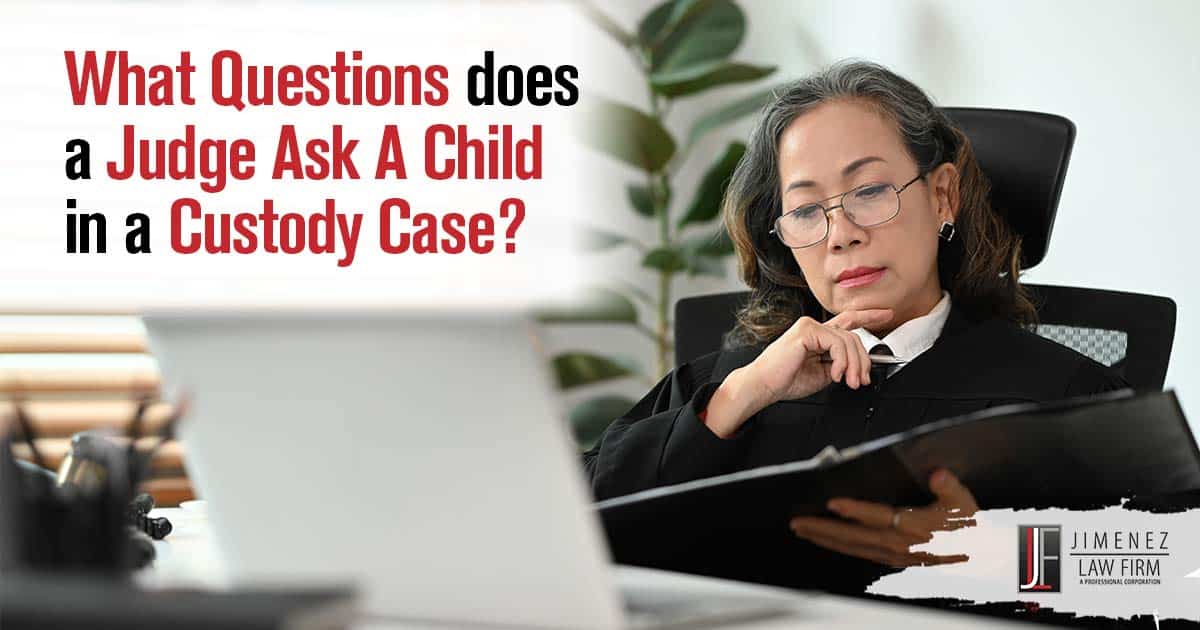Custody cases in Texas can be an emotional time for all those involved. In many cases, the judge will ask the child a variety of questions to get a better understanding of what is happening in the home and who the child would prefer to live with. The questions asked by the judge will vary depending on the age and maturity level of the child, but often focus on the child’s living situation, routines, and relationships with both parents.
How Common is it for a Judge to Interview a Child for a Custody Case?
The frequency of child interviews in a custody case greatly varies, depending on the family dynamics and type of case. In some cases, such as those where one parent is accused of abuse or neglect, the judge may more aggressively seek out input from the child.
For young children, a judge might primarily look to their parents and other legal professionals to understand the child’s situation. In contrast, for older children, a judge may choose to interview them directly to fully comprehend their wishes and feelings about the custody arrangement.
What Questions Do Judges Most Often Ask?
When interviewing a child for a custody case, the judge may ask questions such as:
- How do you feel about spending time with each parent?
- Do you have any concerns or worries about living with either parent?
- What are your daily routines like in each household?
- How often do you see both parents and how is that relationship?
- Who helps take care of you when each parent is not around?
These types of questions often help provide the court with an in-depth understanding of what the child’s home life may look like and which parent would be better suited to care for them. Ultimately, judges will use these conversations as part of their decision-making process when determining who should retain custody of the child.
While these conversations can be difficult for a child, they are an important part of the legal process and can provide valuable insight into how best to protect the interests of the involved parties.
By understanding what questions may be asked in court and why, those wanting to seek custody of or object to custody arrangements can better prepare themselves both emotionally and legally.
Will My Children Get a Say in Child Custody in Texas?
In Texas, children generally do not have the legal right to choose which parent they want to live with. However, a judge will consider their wishes when making a custody decision. The court must consider what is in the best interest of the child and how each arrangement may affect them emotionally, mentally, and physically.
Ultimately, it is up to the judge’s discretion to determine which parent should receive custody and if both parents are deemed fit, then visitation rights may also be awarded. Therefore, understanding what questions a judge may ask your child can help you better prepare for any potential interviews or meetings during your case.
The Child’s Age Plays a Role in Having a Say in Child Custody in Texas
In Texas, the age of the child will also factor into whether a judge will consider their wishes when determining custody. Generally, if a child is over twelve years old, then their opinion may be taken into consideration by the court.
However, even with older children, rather than granting them full autonomy to choose which parent they would like to live with, a judge might instead ask about who they feel most comfortable living with and why.
While it may seem daunting at first, it is important to understand that judges are ultimately seeking what’s best for the child in the custody case and are there to ensure their interests are kept in mind.
By understanding the process of a Texas child custody case and what questions a judge may potentially ask your child, you can better prepare yourself for any potential court proceedings or interviews. In doing so, you will be more mentally prepared to face any emotional situations that arise during your case.
Child Custody in Texas is Still at the Court’s Discretion
Although the opinion of your child may be taken into consideration by a judge in Texas, the court ultimately retains full discretion when making any decisions about custody.
This is why it’s important to understand that no matter what your child’s opinions or wishes may be, the outcome of the case will still ultimately depend on the judge’s evaluation and decision. Understanding both Texas law and what questions may come up can help you better prepare for any potential court proceedings or interviews during your case.
By knowing what questions may arise in court and understanding how best to answer them, parents and children alike can gain a sense of control over their situation when faced with emotional circumstances such as those present in a custody case.
When faced with a custody case in Texas, it is important to remember that the court will always act in the best interest of any children involved and attempt to make sure their voices are heard throughout the process. By understanding the potential questions asked by a judge and how best to answer them, both parents and children can be better prepared for whatever outcome may come from a custody case. With this knowledge, you can make sure your family’s interests are taken into consideration during this emotional time.
A Walkthrough of the child’s right to confer with a Judge
It is important to remember that in many cases, the judge presiding over a custody case will also provide an opportunity for the child to meet with them alone to discuss their opinion. This is known as conferring and allows the judge to gain a better understanding of your child’s emotional state during this challenging time.
In Texas, when it comes to conferring, any person under 17 years old may be allowed by the court to have private meetings and interviews with the judge without either parent or legal guardian present. However, depending on the age and maturity level of the child, these meetings may be more open-ended discussions about what is going on in their life rather than specific questions about which parent they would prefer to live with.
In any case, it is important to remember that the court will take into consideration your child’s opinion when making any decisions about custody and they are there to ensure their interests are kept in mind.
By understanding the process of a Texas child custody case and what questions a judge may potentially ask your child, you can better prepare yourself for whatever outcome may come from the proceedings. This is key to ensuring that not only your own interests but those of your children as well remain safeguarded throughout this emotional process.
Get Legal Representation for Cases of Child Custody in Texas
When it comes to child custody in Texas, the court’s ultimate discretion still stands, and having a strong legal team on your side can often help ensure that your best interests are taken into consideration during this emotional time. A skilled attorney will be able to provide you with guidance throughout the process and ensure that both your and your children’s rights remain safeguarded.
If you or someone you know is facing a child custody case in Texas, contact an experienced family law attorney at The Jimenez Law Firm today for advice on how best to proceed and protect yourself from any potential risks. With their help, you can make sure that any decisions about custody are made with not only your but also your child’s best interest at heart.
Whether you are fighting for sole custody or joint custody, the state of Texas takes child custody, visitation, and child support seriously. If you and your spouse are getting a divorce, or even if you’ve never married, it’s a good idea to consult with a lawyer about child custody matters. Experienced lawyers can walk you through the evidence you’ll need to provide to prove your case. They can help you and the child’s other mother or father establish a parenting plan. Attorneys can also help you through mediation so you and the other parent can practice effective communication to discuss important issues such as school, extra-curricular activities, and work together to compromise on the issues in question.
Call The Jimenez Law Firm today at (214) 513-0125 to speak with an experienced child custody attorney about your child custody and child support case.


